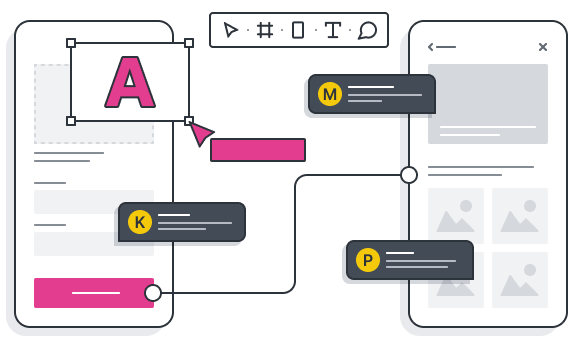Mentorship is a powerful tool for personal and professional development. For UX beginners, a mentor can help them consolidate their past experiences and confidently map out a path to their dream UX career. For UX mentors, it’s a rewarding opportunity to ‘pay it forward’ to the next generation of UX.
If you’ve decided you’d like a UX mentor, you’re taking a sizeable step towards becoming a more experienced — and more confident — UX designer. At this stage, you might be faced with one glaring question: How do I actually go about finding a UX mentor?
Fortunately, there are a few different approaches you can take when finding a UX mentor. In this blog post, we’ll walk you through the benefits of having a UX mentor — and where to find one. We’ll also leave you with a few practical tips on how to get the most out of your mentorship.
- What is the value of a UX mentor?
- How to find a UX mentor
- How to get the most out of your UX mentor
- Final thoughts
What is the value of a UX mentor?
Mentorship has gone from being a ‘nice to have’ perk to being widely considered a vital component of UX career progression. The field of UX can seem overwhelming and competitive, particularly for beginners, full of confusing jargon and endless variations of UX job titles. It’s a lot to grapple with and a UX mentor can help you make sense of it all.
UX mentors are seasoned professionals who bring a wealth of UX experience to the table to help you forge a fulfilling UX career. They’ve been in your shoes, made similar mistakes and learned invaluable lessons on their path to success. What’s more, they’re in your corner; providing actionable ways to help you overcome impostor syndrome and cheering you on as you build confidence.
UX mentors are so much more than personal cheerleaders. Your UX mentor will serve as your personal reference point for modern UX standards – sharing insights on the skills, tools and best UX practices that employers look for. They’ll teach you how to hone your technical abilities to be a cut above the rest.
Some of the benefits of having a UX mentor include:
- Support with getting your UX career off the ground, including interview advice, professional references and teaching you how to negotiate salary
- Helping you improve your technical UX skills by offering design feedback, suggesting side projects, running design challenges, helping you identify which skills to add to your arsenal and helping you build and optimise your portfolio
- Helping you overcome impostor syndrome by providing a safe space to ask questions, helping you identify and overcome mental blocks and helping you gain fresh perspectives on your ‘beginner’ status
- Encouraging a more active engagement in UX by cutting through the noise to find useful resources, fun networking opportunities and helping you boost your visibility in the UX community
- Helping you build your niche and understand which projects, sectors and skill sets best align with your goals and personality so you can work towards your dream UX role
Once a UX leader becomes your mentor, they are officially invested in your success. Rather than a blanket ‘one size fits all’ approach, they’ll offer tailored support and guidance to help you reach your goals. Whether they’re hands on/hands off, if you meet remotely or face-to-face, whether they’re helping you overcome a specific challenge or offering more general guidance, everyone’s relationship with their UX mentor looks different.
How to find a UX mentor
Search UX mentorship websites
As the tech world continues to uncover the endless benefits of mentoring, there’s been a whole host of new startups and platforms to help UXers find their ‘perfect match’ in a mentor. Some are free, some are paid but they are all are worth having on your radar, depending on what your needs are.
MentorCruise is among the most popular tech mentor sites, allowing you to find and connect with world-leading UX mentors at a few clicks of a button. Another great website to find mentors is ADPList.
Join UX communities
When it comes to finding a mentor, don’t underestimate the power of networking. From Slack groups to meetups, the field of UX is abundant with supportive and active communities based all over the world. You’ll naturally start making connections with like-minded UXers, increasing your visibility in the UX space as you go. The more active and engaged you are with workshops, meetups and social media, the more likely you’ll be seen by senior UX designers as a worthy and enthusiastic potential mentee.
Popular UX communities include Ladies that UX, User Experience Design (Reddit) and the extended UX Design Institute student community.
Approach someone
It’s possible that you’ve already got someone in mind for mentorship. Maybe they’re already working within your specific niche or have a similar background to yours. It might even be someone you already know, whether you’ve worked with them or have met them at networking events.
When taking this approach, it’s important to do it the right way. The last thing you want is to pressure someone into saying yes or blindsiding them into agreeing to something they don’t actually have time for. Remember: UX leaders are usually super busy, so don’t take it personally if it’s not something they have capacity for. Instead, focus on relationship building. If you lay the foundations with someone, you might make enough of an impression for them to consider mentoring you down the line.
Put the word out there
Putting yourself out there on social media isn’t easy. But sometimes, the first step to finding a UX mentor is helping them find you. Chances are there are already some interested UX leaders within your network and a simple LinkedIn post will help you get the word out.
This also means you’re not putting any pressure on specific individuals to respond to your mentorship request; the more specific you are with what you’re looking for in your post, the more likely you are to find someone who’s able to meet your expectations (and has the capacity to do so). You’ll also get people commenting with useful UX mentorship sites and resources. Win-win!
Enrol in a class or course
If you’re new to UX, and you’re looking for a mentor to help you develop your skills and confidence, it’s worth considering enrolling in a UX course. Many UX design courses include a course mentor – for example, UX Design Institute’s Professional Diploma in UX Design has mentorships built into their programme – and they bring years of industry experience to the table to help you forge a fulfilling career in UX. These mentorships are offered in the form of multiple weekly live webinars which students have unlimited access to throughout their time on the course.
UX Design Institute’s webinar mentors have a clear sense of how you’re learning, what you’re working on, and which milestones you’re working towards.
How to get the most out of your UX mentor
Set clear objectives and expectations
Before you’ve even had your first meeting, it’s important to reflect on what exactly you’re looking to get out of being mentored by this particular person. What are the specific areas you’re looking for advice on? Where are you looking to grow and develop? What is the expected commitment level for both of you?
Working out your objectives will allow you to prepare better and it will help your mentor tailor each session to make it relevant for the specific challenge you’re facing. It also means you’re both able to work towards a specific goal or milestone, working out how long it will take to get there.
Be proactive
A mentor is investing their time and energy into helping you succeed, so it’s only fair that you return the favour with a proactiveness and enthusiasm. To ensure all the responsibility doesn’t fall on your mentor, take the initiative to schedule meetings and send check-ins or follow-ups.
You can also be proactive in driving the conversation forward during each session — after all, it’s a crucial leadership skill. Make sure to take notes during each meeting, so you can circle back to the topics you discussed last time and use that as a jumping point for that days agenda. Make sure you have questions prepped ahead of time and that you’re ready to receive feedback as it comes.
Implement the guidance
This might seem obvious but it’s worth highlighting. Mentorship is a two-way relationship. Both parties are putting in effort in order to see results. If your mentor is going out of their way to offer you bespoke guidance and feedback, it’s imperative that you enthusiastically implement that feedback and update your mentor on how it went.
Some patterns are harder to break than others but if your mentor feels like they’re constantly repeating the same feedback, they’ll eventually lose interest. Make it known that you appreciate their insights and perspective.
Stick to a schedule
Whether it’s weekly, monthly or fortnightly meetings, creating a meeting schedule that works for both parties will help to keep you on track. Set target milestones and goals in tandem with face-to-face check-ins to keep yourself accountable.
As the mentor is giving up their time for your benefit, it’s better to take their lead on creating a schedule that doesn’t clash with their other responsibilities. The aim is to make it as convenient for them as possible, which might mean meeting during evenings or early mornings. If your mentor is local to you, you could also find a regular meeting spot (and sweeten the deal with a coffee… on you)
Track your progress
Monitoring your progress is an essential pillar of personal development. By documenting your sessions and having set ‘milestones’, you can measure the impact of the mentorship you’ve received. This will help with keeping you both motivated.
This can be anything from sharing your progress at the start of each session to keeping a diary of your growth. You could even get creative with it and start blogging or vlogging your progress for easy reference. For mentors, seeing how far you’ve come is extremely validating and it’ll help them push you to do even better.
Final thoughts
Finding the right UX mentor isn’t a quick-fix. In some cases, you might be waiting months — or even years — for the right person to come along. But it’s a relationship worth being patient for.
Not everything in the UX world can be taught in a course or learned in a professional environment. Learning invaluable skills from an industry expert will help you feel empowered on your UX journey and it will give you a competitive edge on the tech job market.
Want to learn more about breaking into a career in UX design? Check out this post on how to get started in the UX field.




